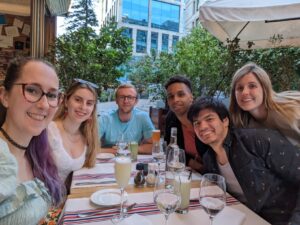In December 2022, a group of SAMBa students and staff travelled to Chile for an Integrative Think Tank (ITT) in the capital city, Santiago. There have been a few previous 'ITT-on-tour' events in Mexico and Germany, but this was the first one I participated in and my first experience of international travel as a PhD student. Coming at the the end of a long winter semester, the Chile ITT provided a welcome opportunity to shift focus away from PhD work, gain international academic experience and work on my tan, so I was excited to get going.
The outbound journey was long, I slept terribly, and the airline lost our luggage. Apart from that it went well. After a quick trip to the shops to buy a change of clothes, we had a few days free for sightseeing ahead of the ITT.
On the first day we explored Santiago, taking an open-top bus tour around the city and going in the cable cars up San Cristóbal Hill. The summit provides a great vantage point and there are some nice little gardens and parks. Later, we found a bar to rest our legs, drink cocktails in the sun, and watch the World Cup. It felt like we had been transported to a new world, much different to the cold, snowy one we had left behind us days before. Unfortunately, in this new world England were still awful at penalties, as Harry Kane demonstrated.
For the following day we had planned a trip to Cajón del Maipo, a canyon in the Andes to the southeast of Santiago. After departing the hotel at 5am, we drove along the winding mountain roads for a few hours before coming to a police road block. A volcanic eruption had triggered landslides, which meant the road was unsafe and we had to turn back. It was a shame to miss out but we saw some incredible scenery along the way and the early start meant we still had most of the day left to enjoy.
Now it was time for the hard work to begin. There were three ITT partners, each posing a set of interesting mathematical challenges, ranging from modelling the collapse of tailing dams to classifying supernovae from time series data. Following the usual ITT schedule, we spent the first two days mulling over the problems and brainstorming ideas before splitting into small teams and beginning the problem formulation process. Working with the Chilean students was a fulfilling experience: they were engaged, got to grips with the ITT model very quickly, and it was nice to see their confidence in communicating in English grow as the week went on. They kindly gave us a tour of their campus, which has some interesting history and a massive underground spiral staircase.
I worked on a project with TARA-CEODOS, a Chile-based consortium who have conducted a series of ocean expeditions collecting extensive data about the marine ecosystem. Our challenge involved developing statistical tools for detecting patterns in this data, with a particular focus on the interplay between genetic diversity and environmental conditions. The data set is pretty complicated and high-dimensional, so there was some overlap with my PhD work.
The groups showcased their ideas at the end-of-week presentations: the astronomy teams had explored methods involving optimal transport and physics-informed neural networks; the tailing dams groups presented some impressive-looking simulations based on various fluid dynamics models.
The ITT was busy but we found time in the evenings to squeeze in some more tourist activities. A highlight (300m high, in fact) was the viewing platform at the top of Gran Torre Santiago, which is like The Shard but more reasonably priced. We spent our last free day visiting the coastal towns of Valparaíso (colourful street murals) and Viña del Mar (beach and seafood).
After a tiring week, it was time to head back to the UK. Our scheduled departure time clashed with the World Cup final; the pilots did the honourable thing and delayed the flight for 'unscheduled maintenance'. Unfortunately this meant we missed our connecting flight and the journey back took 30 hours in total. I think I speak for everyone when I say that the inconvenience was worth it to see Messi lift the trophy and confirm his status as The GOAT.
I'll wrap up with some acknowledgements. First, to the SAMBa team for the once-in-a-lifetime opportunity of a fully-funded trip to South America to do maths. Second, thanks to Eileen, Jenny, Josh, Kat, Piotr and Teo: we made a lot of great memories and kept each others’ spirits up even when everything seemed to go wrong! Finally, thank you to our hosts, Joaquín and Natacha, and all the students/academics at CMM for your generous hospitality and the interesting conversations (mathematical and otherwise) we shared during the week.
Respond




